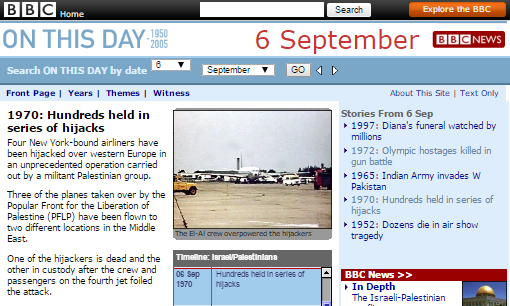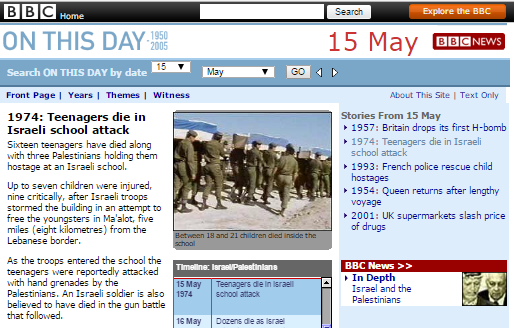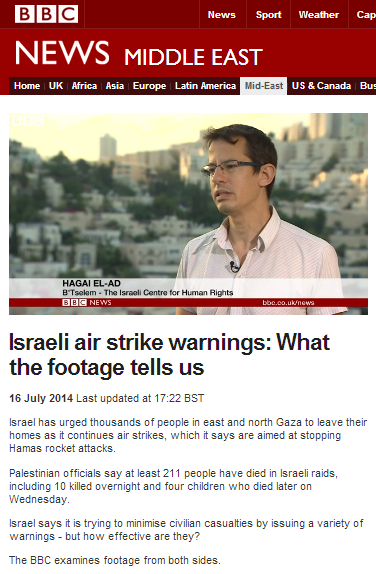BBC Watch is often asked in what year did the BBC’s policy of avoiding the use of the word terrorism when reporting on Palestinian attacks against Israelis begin.
While we do not have a definitive answer to that question, some examples from the BBC’s archived reports indicate that the language used by the corporation when reporting Palestinian terrorism has long displayed the very “value judgements” it claims to avoid.
A BBC report from September 6th 1970 relates to the Dawson’s Field hijackings by the PFLP. Titled “Hundreds held in series of hijacks“, the report opens: [all emphasis added]
“Four New York-bound airliners have been hijacked over western Europe in an unprecedented operation carried out by a militant Palestinian group.
Three of the planes taken over by the Popular Front for the Liberation of Palestine (PFLP) have been flown to two different locations in the Middle East.”
Later on readers find the following:
“The PFLP have demanded the release of three Arab dissidents held in a Swiss jail in return for the 382 passengers they are holding hostage.”
Those so-called “dissidents” were in fact terrorists “serving 12 year sentences in Switzerland for attacking an Israeli airliner in Zurich in 1969”.
Later on in that article, the word “dissident” is also used to describe Leila Khaled.
“On the El Al flight a passenger pinned down an Arab female armed with a grenade who was attempting to get onto the flight deck.
Her fellow hijacker – a male armed with a hand gun – was tackled by a steward.
Several shots were fired, killing the male Arab militant and seriously wounding the crew member, but the pilot was able to make an emergency landing at Heathrow.
The captured female dissident was arrested by armed detectives at the airport and taken to a police station in west London.”
A BBC report dating from September 6th 1972 – “Olympic hostages killed in gun battle” – repeatedly describes the perpetrators of the Munich Olympics terror attack as “guerillas” despite the fact that their victims were civilians.
“All nine of the Israeli athletes kidnapped on Tuesday from the Olympic Village in Munich have been killed in a gun battle at a nearby airport.
A policeman also died in the shooting at the Furstenfeldbruck military airbase, along with four of the guerrillas from the Palestinian group Black September.
Witnesses at the airport said the shooting began when police snipers opened fire on the militants. […]
The guerrillas had previously threatened to kill all the hostages if 200 Palestinian prisoners held in Israel were not released. […]
The West German government had offered to pay any price for the release of the athletes, but was told by the guerrillas’ chief he cared for “neither money nor lives”.”
A report from September 19th 1972 – “Parcel bomb attack on Israeli embassy” – states:
“Palestinian extremist group Black September is thought to have posted the letters. Some were also sent to the Israeli embassy in Paris, sparking a worldwide security alert.”
A report on the Ma’alot massacre dated May 15th 1974 – “Teenagers die in Israeli school attack” – describes convicted terrorists, including Lod airport massacre perpetrator Kozo Okamoto, as follows:
“The Israeli government talked to the hostage-takers, via a loudhailer, and had agreed to release 26 political prisoners held in Israel.”
None of the above articles – or others dating from the 1970s – uses the words terror, terrorists or terrorism. An exception to that rule is found in an article titled “Gunmen kill 16 at two European airports” from December 27th 1985.
“At least 16 people have been killed and more than 100 injured during simultaneous twin terrorist attacks at Rome and Vienna airports.
Gunmen opened fire on passengers queuing to check-in luggage at departure desks for Israel’s national airline, El Al. […]
It comes amid reports airport authorities received warnings Arab militant groups were planning a pre-Christmas terrorist campaign at terminals across the world.”
However, as we see, the BBC’s failure to use accurate language to describe Palestinian terrorism and its perpetrators has been in evidence for nearly half a century. Is it therefore any wonder that so many contemporary British politicians who grew up watching and listening to the BBC so often get the Arab-Israeli conflict wrong?
Related Articles:
BBC Complaints: terror attacks in Jerusalem and Tunisia are “very different”
BBC Complaints clarifies discrepancies in terminology when reporting terrorism
Radio 4 gives insight into BBC avoidance of the use of the term ‘terror’ in Israel
BBC News finds terror (without quotation marks) in Europe
BBC finds a ‘working definition’ for terrorism in Europe
A new BBC ‘explanation’ for its double standards on terror




